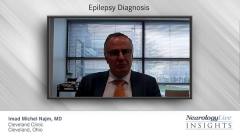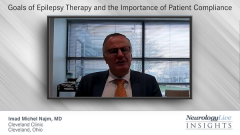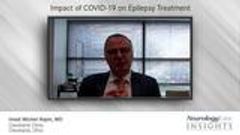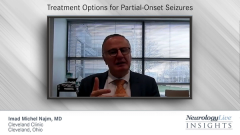
Epilepsy Diagnosis
Imad Michel Najm, MD, discusses various factors to consider when diagnosing epilepsy in patients such as when to start drug therapy as well as patient resistance to medications.
Imad Michel Najm, MD: The way we diagnose epilepsy is by taking a history of the patient’s spells or seizures. The definite diagnosis of epilepsy is the EEG, or the electroencephalogram. In particular, we look for the presence of what we call epileptic spikes. In some situations, when the diagnosis is not too clear, the more definitive diagnosis is based on a recording of seizures in the setting of, most commonly, the epilepsy monitoring unit. It is an inpatient admission, and includes the recording of seizures.
The indications for drug therapy are based on knowing how many seizures a patient has had. The other thing to consider is if there is any abnormality, either on a neurological exam, on the EEG, and on an MRI scan of the brain. If a person has 1 single seizure and the seizure is not triggered—that means out of the blue—the patient would have their first seizure and the patient’s neurological exam would show some abnormalities. Alternatively, the EEG would show epileptic spikes or epileptic activities, or the MRI would show a lesion in the brain that could be epileptic. These are situations in which we will treat, even after the patient has 1 single seizure. If the patient has a seizure that was triggered—because of a lack of sleep, severe stress, mild head trauma, infection, or something like that—if they have only 1 seizure and everything else is normal and that particular trigger is somehow avoidable, we may not need to start the treatment after the first seizure. We would start the treatment after 2 seizures, even if they were triggered because there is a higher risk of seizure recurrence in the long term.
We can never predict who is going to be resistant to starting the medication and who is going to be receptive to taking them. In the majority of cases, obviously the patient does not want to have epilepsy. If you tell them, “You have epilepsy,” they may to say, “I would prefer not to be on medications.” Thinking about the patients who really may be concerned about medications—these are patients who are part of the younger patient population. They may feel medications are going to decrease their cognitive functions, slow down their movements, and make them more sleepy—and therefore, less ability to live their life the way they want to.
Transcript Edited for Clarity
Newsletter
Keep your finger on the pulse of neurology—subscribe to NeurologyLive for expert interviews, new data, and breakthrough treatment updates.










